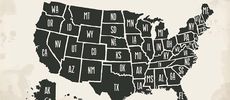Water Industry Conferences You Won't Want to Miss in 2020


Trade shows are a great way for water lab and water industry professionals to learn about new research and strategies, explore advances in technology, and catch up with colleagues. Now is the perfect time to make plans for the conferences and exhibitions you'll attend this year.
Here's a rundown of some of the can't-miss industry events happening in 2020 and what to expect at each one, according to their hosting organizations.
Cooling Technology Institute Annual Conference
When: Feb. 9–13, 2020.
Where: Houston, Texas.
What to expect: This conference offers industry insights and an opportunity to engage in ongoing work on standards and codes relevant to cooling technology. Session topics will include engineering standards, maintenance, thermal performance, and water treatment. In addition, tabletop exhibits from more than 65 vendors will give you a look at the latest products and services.
Who should attend: Manufacturers, building owners and operators, and suppliers of heat rejection systems.
Association of Water Technologies Business Owners Meeting
When: Feb. 10–11, 2020.
Where: Clearwater, Florida.
What to expect: This meeting focuses on the basics of running a business. The schedule features knowledgable speakers, panel discussions, and time to break into smaller groups to discuss key topics. You'll get time to ask questions, share ideas, and brainstorm with owners of water treatment companies.
Who should attend: Water treatment company owners.
American Industrial Hygiene Conference & Expo
When: June 1–3, 2020.
Where: Atlanta, Georgia.
What to expect: Join thousands of health and safety professionals from around the world to explore issues impacting industrial health and worker protection. Learn about recent research and techniques at dozens of sessions, explore new products and technologies, and network with peers. Also, earn up to 18 CE credits by attending the show and viewing recorded sessions afterward.
Who should attend: Occupational and environmental health and safety professionals.
Association of Public Health Laboratories Annual Conference
When: June 8–11, 2020.
Where: Portland, Oregon.
What to expect: At this conference, learn about current issues in laboratory science and attend sessions covering matters of public health laboratory practice. Visit over 65 exhibits on the latest in laboratory technology, supplies, and services, and network with more than 600 colleagues in laboratory management.
Who should attend: Managers and directors in public health, clinical, and academic sectors; environmental and agricultural laboratory managers and directors; public health professionals and clinicians; and government officials.
Association for Professionals in Infection Control and Epidemiology Annual Conference
When: June 10–12, 2020.
Where: Phoenix, Arizona.
What to expect: The largest gathering of infection prevention professionals in the world promises three days of learning, networking, and inspiration. Plan on more than 100 educational sessions with potential for 16 CE hours to maintain professional certifications. See the latest products and services from over 270 exhibitors and network with thousands of industry professionals.
Who should attend: Infection prevention professionals.
American Water Works Association Annual Conference and Exposition
When: June 14–17, 2020.
Where: Orlando, Florida.
What to expect: This conference focuses on water sector challenges from infrastructure renewal, supply, and quality to resiliency, affordability, and workforce. Learn about leading-edge solutions to effectively manage and protect water resources. The event includes tours and workshops, courses and certifications for public officials, hundreds of exhibitors displaying the latest solutions, and networking opportunities with over 12,000 professionals.
Who should attend: Water industry professionals.
National Environmental Health Association Annual Educational Conference & Exhibition
When: July 13–16, 2020.
Where: New York City, New York.
What to expect: The conference brings together professionals from around the globe to discuss current and emerging environmental health issues, including disaster management. Attend training and educational sessions, including preconference workshops; earn CE contact hours; see new products and services at the exhibition; and network with more than 1,200 peers.
Who should attend: Environmental health professionals.
American Society for Health Care Engineering Annual Conference
When: Aug. 2–5, 2020.
Where: Chicago, Illinois.
What to expect: This conference for health care facility and engineering professionals helps prepare attendees for evolving trends and challenges in these respective industries. Gain valuable tools and resources, earn up to 33 CE contact hours, visit hundreds of exhibitors showcasing the latest technology, and network with more than 3,500 colleagues.
Who should attend: Health care facility managers, engineers, architects, designers, constructors, and infection control specialists.
Association of Water Technologies Annual Convention & Exposition
When: Sept. 30 through Oct. 3, 2020.
Where: Louisville, Kentucky.
What to expect: This conference features interactive educational sessions that provide information you can use to extend equipment life, maximize energy efficiency, reduce downtime, and provide the highest quality service. Learn about industry developments, see demonstrations of new products and technologies in the exposition, and network with leaders in the water treatment field.
Who should attend: Water treatment professionals.
Water Environment Federation Technical Exhibition and Conference
When: Oct. 3–7, 2020.
Where: New Orleans, Louisiana.
What to expect: The largest annual wastewater exhibition and conference features nearly 200 technical sessions, workshops, mobile sessions, and local facility tours on topics such as collection systems, plant operations and treatment, regulations, and utility management. Earn up to 16.5 CE professional development hours and eight general contact hours per day visiting the exhibition, where over 1,000 companies will display cutting-edge technologies. Network with more than 20,000 registrants from around the world representing all sectors of the water quality industry.
Who should attend: Water quality and wastewater professionals.
Canadian Water and Wastewater Association National Water and Wastewater Conference
When: Nov. 8–11, 2020.
Where: Niagara Falls, Ontario, Canada.
What to expect: This event covers all aspects of water management, from wastewater to drinking water research to utility and infrastructure challenges. Gain knowledge and perspective at the keynote addresses and during several technical tracks. Visit the exhibitor marketplace, earn CE credits and professional development hours, and network with industry professionals.
Who should attend: Water quality and wastewater professionals.
American Water Works Association Water Quality Technology Conference
When: Nov. 15–19, 2020.
Where: Schaumburg, Illinois.
What to expect: This meeting features oral and poster technical sessions, preconference workshops, educational facility tours, a dedicated hall with more than 60 targeted exhibitors showcasing the latest in water quality technology and services, and opportunities to network with peers.
Who should attend: Water quality professionals.
Not only does attending conferences allow you to learn about new trends in the water industry and network with colleagues, but they also present a prime opportunity to connect with new customers or vendors. Attending industry events like these is one of the best things you can do to position your business for success in 2020 and beyond.






